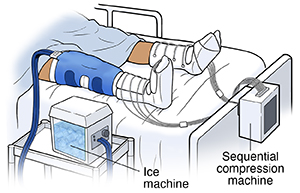Your healthcare team will keep track of your progress after your surgery. During the surgery, you may receive general anesthesia (puts you to sleep), an epidural nerve block in your spinal canal (numbs you from the waist down), or a femoral nerve block in your leg (numbs your whole leg). Sometimes the femoral nerve block is added to another anesthesia for better sedation and pain control. Your team will use support equipment to help you recover. Be sure to let them know how you feel and how well your pain is controlled. You may also receive medicines, such as antibiotics and blood thinners.
Support equipment
Special tubes and machines help you recover after surgery. They may include:
-
An IV (intravenous) line to provide needed fluids and medicines
-
A tube (catheter) to help drain your bladder
-
A drainage tube in your leg to remove excess fluid that may build up, and to reduce swelling
-
An ice machine or ice pack to reduce pain and inflammation that carries cold water to the knee joint
-
A sequential compression machine to prevent blood clots by gently squeezing and then releasing your foot or calf
-
A continual passive motion machine may be advised to increase flexibility by gently moving your knee
Managing pain
When pain is controlled, you’ll walk sooner and recover faster. So be honest about how much pain you feel. And don’t be afraid to ask for pain medicine when you need it. Your nurse may give you pain medicine by IV (intravenous) line into your hand or arm, or by mouth (orally) while in the hospital. You will be given a pain pill prescription for use at home. patient-controlled analgesia Tell your nurse if the medicines don’t reduce pain or if you suddenly feel worse.
Featured in


